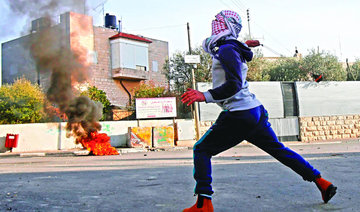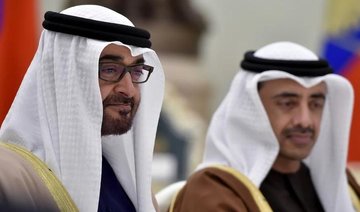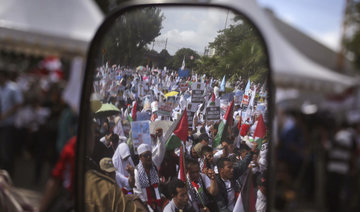JERUSALEM: The French and Israeli leaders sparred verbally Sunday over the US decision to recognize Jerusalem as Israel’s capital, while new violence rippled across the region following the move by US President Donald Trump.
In Jerusalem, a Palestinian stabbed an Israeli security guard, seriously wounding him in the first attack in the volatile city since Trump’s pronouncement Wednesday. In Beirut, scores of Lebanese and Palestinian demonstrators clashed with security forces outside the heavily guarded US Embassy, and Arab foreign ministers meeting in Cairo demanded that the United States rescind the decision.
The move upended decades of US policy, and a longstanding international consensus, that the fate of Jerusalem be decided in negotiations. Israeli and Palestinian claims to the city’s eastern sector form the emotional core of their conflict, and Trump’s announcement was seen as siding with the Israelis and has drawn wide international criticism.
At a meeting in Paris with Israel’s visiting prime minister, French President Emmanuel Macron condemned recent violence against Israelis. But he also expressed “disapproval” of Trump’s decision, calling it “dangerous for peace.”
“It doesn’t seem to serve, in the short term, the cause of Israel’s security and the Israelis themselves,” Macron said.
He urged Israel to freeze its construction of settlements on occupied lands and called for other confidence-building measures toward the Palestinians.
Israeli Prime Minister Benjamin Netanyahu, who has called Trump’s decision “historic,” said Israel has maintained its capital in the city for 70 years and the Jewish connection to Jerusalem goes back 3,000 years.
“Paris is the capital of France, Jerusalem is the capital of Israel,” he said. “We respect your history and your choices. And we know that as friends, you respect ours.”
“I think the sooner the Palestinians come to grips with this reality, the sooner we move toward peace,” he added.
The exchange between the two allies set the stage for what could be a tense meeting Monday for Netanyahu with European Union foreign ministers in Brussels. The Jerusalem issue and the moribund peace process are expected to be high on the agenda.
Last week, EU foreign policy chief Federica Mogherini warned that Trump’s decision “has the potential to send us backward to even darker times than the one we are already living in.”
She also warned that Trump’s “move could diminish the potential role that the United States could play in the region and create more confusion around this.”
The meeting could be a precursor for what seems to be an emerging rift between Israel and the US on one side, and Europe and the Palestinians on the other.
Palestinian President Mahmoud Abbas has said Trump’s decision has in effect disqualified the US from continuing in its role as the traditional mediator of peace talks. The Palestinians have spent recent days trying to rally Arab and broader international opposition to the decision.
After Abbas political adviser Majdi Khaldi said Saturday that the Palestinian leader won’t meet with Vice President Mike Pence when he visits the region this month, a spokeswoman for Pence said Sunday it was “unfortunate that the Palestinian Authority is walking away again from an opportunity to discuss the future of the region.”
EU leaders, including Macron, have reiterated support for establishing an independent Palestinian state alongside Israel. Trump has said he would support the idea if both sides endorse it — effectively giving Israel a veto over any peace proposal. Netanyahu’s government is dominated by opponents to Palestinian independence. Trump’s Middle East team, headed by his son-in-law Jared Kushner, has been working for months on a peace plan but has not yet released it.
Israel captured east Jerusalem from Jordan in the 1967 Middle East war and annexed the area to its capital in a move that was not internationally recognized. The Palestinians claim east Jerusalem as the capital of a future state, along with the West Bank and Gaza Strip.
East Jerusalem is home to Judaism’s most sacred site, as well as key holy places for Christians and Muslims. These conflicting claims have erupted into deadly bloodshed in the past.
A senior US official appealed to world leaders, especially in the Middle East, to calm regional tensions.
Acting Assistant Secretary of State David Satterfield told Arab journalists that Trump’s pronouncement was merely a “recognition of simple reality” that Israel’s government already is in Jerusalem.
He said the US was not prejudging final-status negotiations about the city’s final borders and expressed hope that world leaders understand the US is committed to moving forward with a peace plan he expects to be unveiled in the new year.
“This is a question of choice: Do leaders choose to speak to their peoples, to their regions in terms that reflect reality or in terms that incite or inflame?” he said. “We hope it’s the former.”
The Palestinians staged three “days of rage” after Trump’s dramatic announcement, with clashes breaking out in flashpoints across the West Bank, east Jerusalem and the Gaza Strip, and Gaza militants firing rockets into Israel. Four people in Gaza were killed. In the West Bank, there were dozens of injuries, but no deaths.
There were indications that Sunday’s stabbing at the Jerusalem bus station was motivated by Trump’s move, although police did not officially confirm it.
They said the attacker was a 24-year-old Palestinian from the West Bank city of Nablus. Israeli media identified him as Yassin Abu Al-Qarah, who posted on his Facebook page in recent days about Jerusalem, saying “our blood is devoted” to the holy city. Comments on his profile called him a hero for the alleged attack.
Police spokesman Micky Rosenfeld said the guard sustained a serious wound to his upper body and the attacker was apprehended.
Palestinian youths also clashed in the West Bank city of Bethlehem, hurling stones at Israeli soldiers, who fired back with rubber bullets and tear gas.
In Beirut, Lebanese security forces broke up the protest outside the US Embassy after demonstrators pelted them with stones. After a rowdy start, the protest drew several hundred people and became more peaceful, with demonstrators chanting and singing.
Clashes resumed in the afternoon, with security forces chasing and arresting a handful of protesters and lobbing tear gas. Lebanon is home to 450,000 Palestinian refugees, nearly 10 percent of the population.
In a resolution long on rhetoric but short on concrete actions, Arab foreign ministers demanded the recognition decision be rescinded and urged the UN Security Council to adopt a resolution condemning Trump’s decision. They acknowledged that Washington would most likely veto it.
If the US vetoes such a resolution, the Arabs would seek a similar resolution in the UN General Assembly, Palestinian Foreign Minister Riyad Malki told a news conference in Cairo.
With few options for the Palestinians, and the Arab world preoccupied by other crises, Arab willingness to press the issue may be limited. In Paris, Netanyahu talked about his quiet but improving relations with Arab countries that look to Israel as an ally against Iran.
“There is in this a blessing, because this could help pave the way to an ultimate peace between us and our Palestinian neighbors and between us and the rest of the Arab world,” he said.
Nikki Haley, the US ambassador to the UN, defended Trump’s move.
“For those who want to say this is a bad idea, I’ll tell you: Ask us five or 10 years from now if you still think it’s a bad idea. Because I really do think this is going to move the ball in the peace process,” she told CNN’s “State of the Union.”
Israeli, French leaders tangle over US Jerusalem decision
Israeli, French leaders tangle over US Jerusalem decision

Jordan and Qatar condemn burning of Gaza hospital by Israeli forces

- Actions of troops are a ‘heinous war crime’ and ‘blatant violation of international law and humanitarian law,’ Jordanian Foreign Ministry says
- Qatar calls it a ‘dangerous escalation’ with potentially ‘dire consequences for the security and stability of the region’
LONDON: Jordan has described the actions of Israeli forces in clearing and burning one of the last hospitals that was still operating in northern Gaza as a “heinous war crime.”
Troops stormed the Kamal Adwan Hospital in Beit Lahia on Friday, forcing staff and patients from the building and setting fire to it.
Sufian Al-Qudah, a spokesperson for Jordan’s Ministry of Foreign Affairs, said the attack was a “blatant violation of international law and humanitarian law. Israel is also held accountable for the safety of the hospital’s patients and medical staff.”
Jordan categorically rejects the “systematic targeting of medical personnel and facilities,” he added, and this was an attempt to destroy facilities “essential to the survival of the people in the northern Gaza Strip.”
Al-Qudah urged the international community to put pressure on Israel to halt its attacks on civilians in Gaza.
Qatar also denounced “in the strongest terms” the attack on the hospital as a flagrant violation of international humanitarian law.
The country’s Foreign Ministry said it represented a “dangerous escalation of the ongoing confrontations, which threatens dire consequences for the security and stability of the region,” and called for the protection of the “hundreds of patients, wounded individuals and medical staff” from the hospital.
UN worker seriously hurt in Israeli Yemen strike moved to Jordan, WHO says

- WHO chief Tedros was at Sanaa airport with his team when Israel attacked
ZURICH: The UN worker hurt in an Israeli air strike on Yemen’s main international airport on Thursday suffered serious injuries and has been evacuated to Jordan for further treatment, the World Health Organization said on Friday.
Israel said it had struck multiple targets linked to the Iran-aligned Houthi movement in Yemen, including Sanaa International Airport, and Houthi media said at least six people had been killed.
“Attacks on civilians and humanitarians must stop, everywhere. #NotATarget,” WHO Director-General Tedros Adhanom Ghebreyesus said in a post on X that showed him sitting in a plane looking across at what appeared to be the injured man.
Tedros was at the airport waiting to depart when the aerial bombardment took place that injured the man, who worked for the UN Humanitarian Air Service. A spokesperson for the WHO said the man had been seriously injured.
Tedros said he and the UN worker were now in Jordan.
The man underwent a successful surgical procedure prior to his evacuation for further treatment, Tedros said.
He had been in Yemen to negotiate the release of detained UN staff and to assess the humanitarian situation.
Jordan’s King Abdullah reaffirms support for Syria’s sovereignty, calls for Gaza ceasefire

- King in phone conversation with French president
AMMAN: King Abdullah II reaffirmed on Friday Jordan’s commitment to supporting Syria in building a free, independent, and fully sovereign state that reflected the aspirations of all its people.
In a phone conversation with French President Emmanuel Macron, the king emphasized the importance of Syria’s security, and stability for the Middle East region as a whole. He also reiterated Jordan’s firm stance against any violations of Syria’s territorial integrity and sovereignty, Jordan News Agency reported.
Syria faced nearly 14 years of devastating civil war before the fall of President Bashar Assad’s regime earlier this month following a swift takeover by militants led by Hayat Tahrir Al-Sham.
The country remains fragmented, grappling with the challenges of rebuilding amid competing political and military influences.
The discussion between King Abdullah and Macron also addressed the ongoing Israeli war on Gaza.
The conflict, which erupted in the aftermath of a Hamas attack on Israeli territory on Oct. 7 last year, has led to a humanitarian crisis in the Palestinian enclave, with tens of thousands of lives lost and infrastructure heavily damaged.
King Abdullah called for an immediate cessation of hostilities and a strengthened humanitarian response to alleviate the suffering of Palestinians trapped there.
He also stressed the urgent need for progress toward a just and comprehensive peace in the region, underscoring the two-state solution as the basis for resolving the Israeli-Palestinian conflict.
King Abdullah highlighted the importance of sustained efforts to ensure the success of the ceasefire in Lebanon.
Syrian equestrian champ reveals 21 years of torture at hands of Assad regime

- Adnan Kassar was friends with Bassel Assad until overshadowing him at a championship event in 1993
- Kassar was detained, and his treatment worsened after Bassel’s death a year later
LONDON: A former champion equestrian has revealed the torture he suffered when he was detained by the Syrian regime after besting the older brother of former ruler Bashar Assad.
Adnan Kassar told Sky News he endured 21 years of imprisonment, during which he was physically and mentally abused, after Bassel Assad, his teammate at the 1993 International Equestrian Championship, became irritated at his performances.
The two had been good friends, but Kassar’s showing won his team the gold medal at the event on home soil in the port city of Latakia, after Bassel had produced a poor display.
“The crowd lifted me on their shoulders. It was a moment of pure joy, but for Bassel, it wasn’t the same. That day marked the beginning of my nightmare,” Kassar told Sky.
He was later arrested over what he called “fabricated” accusations and subjected to severe physical and psychological abuse.
“I was kept underground for six months, beaten constantly, and interrogated without end,” he said.
Bassel had originally been tipped to succeed his father, Hafez Assad, as Syria’s ruler. However, Bassel died in a car crash in 1994, propelling the younger Bashar to power.
For Kassar, though, Bassel’s death only made his situation more dire, as he was transferred to Sednaya Prison, where “the torture only got worse.”
Kassar said: “They blamed me for his death. Every year on the anniversary of his passing, the torture intensified.”
He was later sent to Tadmur Prison for seven-and-a-half years.
“They pierced my ear one morning and broke my jaw in the evening,” Kassar said. “For praying, they lashed me 1,000 times. My feet were torn apart, my bones exposed.”
Kassar was released in 2014 after a campaign of appeals by international human rights groups. For years, he resisted discussing his time in captivity for fear of reprisals but felt ready to speak after the fall of the Assad family.
“After years of imprisonment, torture, and injustice, the revolution finally toppled the dictatorial regime,” he said.
Iran FM warns against ‘destructive interference’ in Syria’s future

- Abbas Araghchi: Iran ‘considers the decision-making about the future of Syria to be the sole responsibility of the people... without destructive interference or foreign imposition’
BEIJING: Iran’s top diplomat warned Friday against “destructive interference” in Syria’s future and said decisions should lie solely with the country’s people, writing in Chinese state media as he visited Beijing.
Abbas Araghchi touched down in the Chinese capital on Friday afternoon, Iranian state media reported, to begin his first official visit to the country since being appointed foreign minister.
China and Iran were both supporters of ousted Syrian president Bashar Assad.
Assad fled Syria this month after an Islamist-led offensive wrested city after city from his control, with the capital Damascus falling on December 8.
Iran “considers the decision-making about the future of Syria to be the sole responsibility of the people... without destructive interference or foreign imposition,” Araghchi wrote in a Chinese-language article in People’s Daily published on Friday.
He also emphasized Iran’s respect for Syria’s “unity, national sovereignty and territorial integrity.”
Iran’s supreme leader – a key backer of Assad’s administration – predicted on Sunday “the emergence of a strong, honorable group” that would stand against “insecurity” in Syria.
Ayatollah Ali Khamenei said Syria’s young men would “stand with strength and determination against those who have designed this insecurity and those who have implemented it, and God willing, he will overcome them.”
In People’s Daily, Araghchi said supporting the Syrian people was a “definite principle (that) should be taken into consideration by all the actors.”
Beijing had also built strong ties with Assad – he met President Xi Jinping in China last year, where the two leaders announced a “strategic partnership.”
China has affirmed its support for the Syrian people and has said it opposes terrorist forces taking advantage of the situation to create chaos.
Araghchi’s two-day visit will include talks with his Chinese counterpart Wang Yi, according to Iran’s foreign ministry.
China is Iran’s largest trade partner, and a top buyer of its sanctioned oil.
Xi pledged in October to increase ties with Iran during talks with his counterpart Masoud Pezeshkian in Russia on the sidelines of a BRICS summit.
Araghchi told reporters in a video published by Iranian state media as he arrived in Beijing that the visit was taking place “at a very suitable time.”
“Now it is natural that there are sensitive situations, both the region has various tensions, and there are various issues at the international level, also our nuclear issue in the new year will face a situation that needs more consultations,” he said.
“The invitation of our Chinese friends was for this reason, that at the beginning of the new year... we should think together, consult and be ready for the challenges that will come.”
He wrote in his editorial that Iran and China shared the “common view” that calling for an immediate ceasefire in Gaza was the biggest priority in the Middle East.






















